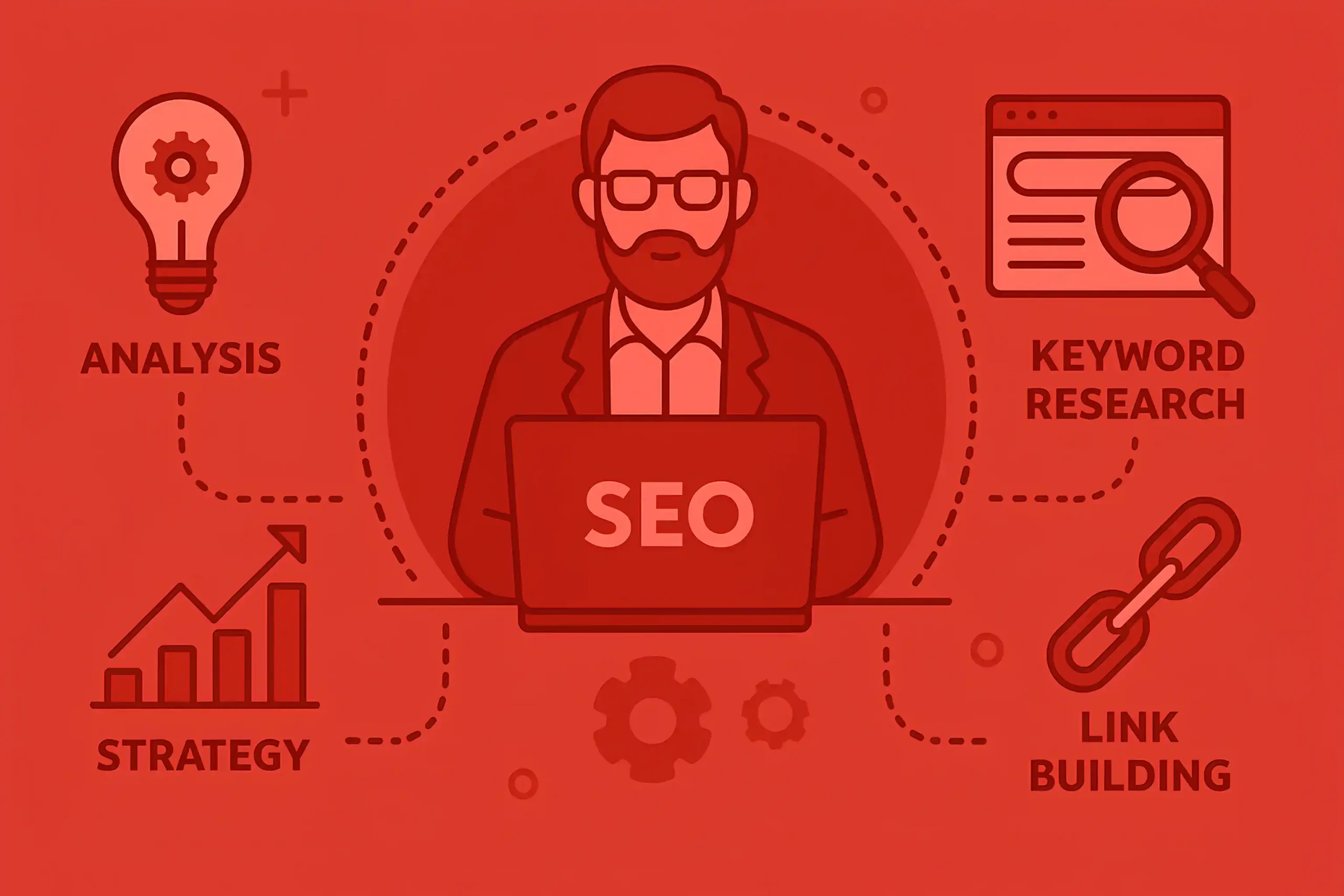Choosing between an SEO consultant and an SEO agency can feel like standing at a crossroads. Both can help improve your online visibility, but the right choice depends on your business goals, resources, and the level of hands-on involvement you desire.
A consultant often brings a personalized, one-to-one approach, focusing deeply on strategy and custom solutions, whereas an agency typically offers a full team with broader capabilities, ranging from content creation to link-building and technical SEO.
Each option comes with its own strengths and trade-offs, and what works for a small business might not suit a growing enterprise.
In this guide, I’ll break down the differences clearly, so you can decide which path fits your business best and avoid wasting time or money on the wrong type of SEO support.
Ready to Scale Your SEO?
Book a complimentary 30-minute strategy call to discuss your goals and explore how we can assist you.
SEO Consultant vs SEO Agency: A Quick Comparison at a Glance
When businesses start thinking about SEO support, the big question quickly becomes: should you work with a consultant or bring on an agency? On paper, both promise results, but the way they operate, the level of involvement they require from you, and the kind of outcomes you can expect are often very different.
A clear, head-to-head comparison makes it easier to spot where each option is better and where it falls short. Before diving deeper, let’s line them up and see how an SEO consultant stacks against an agency at a glance.
| Aspect | SEO Consultant | SEO Agency | Best For |
|---|---|---|---|
| Expertise | Deep personal expertise, usually niche-focused. Direct access to one senior expert. | Wide team expertise across multiple areas (technical, content, link building, PPC, etc.). | Consultant → specialized needs; Agency → broad, multi-channel strategy. |
| Cost | Typically lower cost; retainer between $1,500–$2,000+. | Higher monthly retainers ($1,500–$10,000+). | Consultant → small/medium budgets; Agency → larger budgets. |
| Flexibility | Highly flexible, custom approach, easier to pivot quickly. | More structured processes, but less flexible on small adjustments. | Consultant → startups, evolving needs; Agency → enterprises needing structure. |
| Resources | Limited bandwidth (usually one person managing everything). | Large team with capacity to scale campaigns and handle high volume. | Consultant → smaller sites/projects; Agency → large or fast-growing businesses. |
Strategic Depth vs Execution Capacity
At NEWMEDIA.COM, we’ve worked both as consultants guiding businesses and as an agency partner, so we know how this balance plays out.
I think a good SEO agency usually holds the edge because it combines strategic depth with execution power. Strategy alone is not enough if the team behind it can’t implement quickly, and execution without strategy often leads to wasted budgets.
Agencies can move faster because they have specialists across the board: content writers, outreach managers, developers, etc. I mean, it isn’t always black and white. For a small business, a consultant can bring sharper clarity and a more customized approach, while an agency might feel overwhelming.
For larger companies or complex challenges, the agency’s capacity often saves time and prevents bottlenecks. I know many cases where consultants built brilliant roadmaps that never got off the ground simply because execution slowed, and I’ve seen agencies push tasks forward at speed but miss the bigger picture because they didn’t pause to ask why.
The sweet spot, in my view, comes when strategy and execution feed into each other, when the “why” and the “how” are equally respected.
That’s where businesses see real growth, and where the choice between consultant and agency matters most.
Communication Workflow and Response Time
It always comes down to people. I’ve hired and managed both solo consultants and agencies for my projects and for clients, and the pattern I see most often is simple: freelancers can be brilliant but uneven on response time, while agencies with a dedicated account manager usually keep the trains running because their reputation is on the line.
A good agency builds guardrails: clear owners, backups when someone’s out, and a simple path to escalate, so small mistakes don’t turn into big delays. However, there are exceptions.
A disciplined consultant with tight routines and a clear comms plan can reply faster than a large SEO agency that hides behind levels of approvals.
Stay Ahead in SEO
Get weekly insights, trends, and actionable tips delivered to your inbox.
What you'll get:
- Weekly SEO insights
- Exclusive case studies
- Early access to resources
Subscribe
What works best is agreeing on the rules before work starts. Define response windows versus resolution windows, decide what “urgent” actually means, pick one primary channel for day-to-day and one emergency channel, and keep a single living status doc so no one asks, “Where are we on this?”
Our team likes short weekly check-ins, async Loom updates for handoffs, and a shared backlog in Trello or ClickUp so priorities are visible.
If you’re hiring an SEO agency, ask who covers when the AM is offline and how handovers happen. If you’re hiring a consultant, ask about office hours, time zones, and how they prevent single-point-of-failure risk.
Pricing Models and Scope Clarity
Most SEO consultants charge hourly, often ranging anywhere from $75 to $200+, depending on their reputation and track record. This makes sense for consultants because clients usually bring them in for specific tasks, audits, or strategic direction, and an hourly or project-based fee keeps things flexible.
Agencies, on the other hand, tend to favor retainers. A monthly retainer, often anywhere between $1,500 and $10,000+, gives them room to cover the full cycle of SEO: content, technical work, link-building, SEO reporting, and strategy.
Retainers also allow agencies to allocate resources across their teams without nickel-and-diming every step.
Agencies usually spell out deliverables because they have to; unclear scope leads to strained contracts and damaged reputations.
They’ll list the exact number of pages to optimize, the style of reports, the expected link volume, or the turnaround time for fixes. Consultants sometimes match that level of detail, but in my experience, the clarity isn’t always there, especially with freelancers who prefer looser engagements.
That’s why I see businesses getting frustrated when they don’t know what’s included or excluded. The best practice, no matter who you hire, is to insist on a clear scope document upfront or try a no-contract SEO option.
With agencies, it’s almost standard; with consultants, you might need to push for it. In the long run, scope clarity prevents the most common SEO dispute: “I thought that was included.”
Our SEO Services
B2B SEO Services
Drive qualified traffic and boost visibility with tailored SEO solutions
Enterprise SEO Services
Get sustainable growth and higher ROI with data-driven SEO services
SaaS SEO Services
Outrank your competitors and win more customers with expert SEO
Technical SEO Services
Unlock your website’s full potential with powerful, results-focused SEO.
What You Get from Each
If you’ve made it this far, it probably means you’re really weighing your options and not just looking casually. You’re not worried about whether SEO is worth it; you already know it is. What you want to understand now is what each path gives you in return.
An SEO consultant and an SEO agency can both move the needle, but they do it in very different ways. So instead of talking in generalities, let’s break it down and look at what you can realistically expect to get from each choice before you decide which one matches your business best.
Strategy & Audits
From what I’ve seen, consultants usually shine when it comes to strategy. They dig into your business model, your niche, and the specifics of your market to create a plan that feels like it was written just for you.
That’s why it’s so important to ask up front whether the consultant has worked in your industry before, because an eCommerce SEO strategy looks nothing like one for a B2B SaaS or a local service business.
Consultants can also run audits, but more often their value lies in pointing out the “what” and “why,” leaving the “how” for you or your team to execute.
Agencies, on the other hand, cover the whole spectrum. They’ll audit your site in detail, set up the roadmap, and then deploy the team to handle the execution.
If your main goal is a strategy with niche-specific insights, a consultant is usually the smarter choice. But, if you need a full audit with follow-through, an agency is more likely to deliver at scale.
Tools & Software
One of the clearest differences I’ve noticed between consultants and agencies is in their toolbox. Most freelance SEO consultants work with a couple of core tools, maybe Ahrefs or Semrush, plus Google’s free suite.
That’s often enough for building strategies, running keyword research, and doing technical checks, but it can feel limited when deeper testing or advanced workflows are required.
Of course, there are exceptions. A consultant with a steady base of 8–10 monthly clients can usually justify investing in a full stack of paid tools. Still, the average solo consultant won’t have the same range.
Boost Your Organic Results
Turn your website into a lead-generating machine through smart SEO.
Get a ProposalAgencies, on the other hand, have everything. From enterprise-level SEO platforms to automated reporting systems, workflow management software, and even AI-driven auditing tools, they build their entire process around access to these resources.
Best For
I believe there isn’t a single “better” option; it all depends on the situation. If you’re handling something very technical, like an SEO website migration, a consultant with hands-on experience in platforms such as Shopify or WordPress is often the safer bet.
They’ve likely experienced the pitfalls before and can spot issues long before they derail your rankings. On the other hand, if you’re looking for ongoing support, don’t have time to monitor tasks, or want the confidence of a team handling everything from link building to reporting, then an agency is usually the right choice.
But you still need to compare SEO agencies carefully, because not everyone will fit your SEO goals or budget.
A good SEO proposal should make it clear what you’re paying for, so you’re not left wondering why your SEO is not working months down the line. If you’re tempted by cheap SEO promises, remember that long-term growth rarely comes from cut-rate shortcuts.
Finally, the “best for” decision depends on whether you need targeted expertise from a consultant or broad execution capacity from an agency.
The Hybrid Model: Consultant + Execution Team
The hybrid model is something I’ve seen more businesses experimenting with, though it doesn’t always get talked about openly. The idea is simple: you bring in a consultant for strategy and oversight, and you let an execution team, either an agency or an outsourced freelancer, handle the heavy lifting.
On paper, this can give you the best of both worlds. The consultant isn’t tied down with repetitive tasks, so their focus stays on direction, prioritization, and catching problems early.
Meanwhile, the agency executes the plan with the manpower and resources that a single consultant could never match.
I mean, why not? The setup works especially well in situations where the business has a lot at stake and can’t afford a misstep.
Many hybrid approaches thrive in white-label SEO setups. An agency might quietly hire a consultant behind the scenes to build the strategy or troubleshoot a problem, while their in-house or outsourced team delivers the day-to-day tasks under their brand.
The client never sees the consultant directly, but their fingerprints are all over the campaign. It’s a way for agencies to strengthen their offering without hiring full-time senior talent.
Ready to Scale Your SEO?
Book a complimentary 30-minute strategy call to discuss your goals and explore how we can assist you.
Of course, this model isn’t without pitfalls. If the consultant and the execution team aren’t aligned, tasks don’t match the strategy, or the strategies never get executed correctly.
Communication is another factor to consider: the consultant talks to you, you talk to the agency, the agency talks to its team, and sometimes things get lost. To avoid that, I’ve found it critical to establish one shared project space, one reporting format, and clear rules on who has the final say.
When it works, though, the hybrid model is powerful. Startups that can’t afford a full-time senior SEO lead but still want enterprise-level execution can benefit. Established businesses that don’t trust agencies to “think” for them but need their muscle to scale fast can benefit.
Even agencies themselves sometimes rely on this model quietly, using a consultant’s brain with their own execution engine. Done right, it creates a safety net; you’re not relying solely on a single freelancer who might disappear, and you’re not handing blind trust to an agency without independent oversight.
It’s one of those setups that, if structured carefully, can deliver the kind of consistency most businesses rarely see in SEO.
Mistakes to Avoid When Choosing
The first trap is not owning the strategy internally. Whether you hire a consultant or an agency, the vision for where SEO fits into your business should remain yours.
Many companies outsource everything, only to panic when they change partners and realize they don’t even know what’s been done. Strategy is the steering wheel; you can rent the driver, but you shouldn’t give up the wheel.
Then there’s the point of cheap SEO services. I’ve reviewed campaigns where businesses outsourced to low-cost providers in places like Bangladesh or Pakistan, hoping to save money.
Stay Ahead in SEO
Get weekly insights, trends, and actionable tips delivered to your inbox.
What you'll get:
- Weekly SEO insights
- Exclusive case studies
- Early access to resources
Subscribe
What they got were blurry reports, poor-quality content, and PBN links that left their domain worse off than before.
Hiring without clear SEO goals is another mistake I see far too often. If you don’t know whether you want to grow traffic, increase conversions, or dominate a specific market segment, your consultant or agency will just touch the basics in different directions.
We once partnered with a client who said they “just wanted more traffic,” but when our team dug deeper, what they actually needed was leads from a very narrow audience.
The original campaign wasted six months tracking numbers that didn’t matter.
Finally, believing that bigger teams always perform better is misleading. Many boutique agencies of five people outperformed global agencies with hundreds of staff because every member of the smaller team was deeply invested in the client’s success.
Big agencies can offer structure and resources, yes, but they can also bury you under layers of account managers. Bigger doesn’t always mean better; it just means bigger, and sometimes that creates distance instead of results.
Which Option is Better for Small Businesses?
For most small businesses, the decision comes down to budget and control. An SEO consultant is often the better fit if you need a clear strategy, specific guidance, and a hands-on partner without paying for the overhead of an entire agency.
Agencies, however, can save time if you want everything, from technical fixes to content creation, handled under one roof. The right choice depends on whether you value flexibility and personal attention more or convenience and breadth of services.
Can an SEO Consultant Handle All Parts of SEO?
In some cases, yes, but not always. Many consultants are highly skilled in strategy, audits, keyword research, and even technical SEO. However, few consultants manage every single part of SEO at scale, like link outreach, large content production, or ongoing reporting systems.
That’s where an agency or additional support may come in. A strong consultant usually defines the roadmap and either works with your internal team or recommends trusted partners for execution.
Will I Need Internal Team Support If I Hire a Consultant?
Usually, yes. A consultant can set direction, highlight priorities, and even fix specific issues, but you’ll often need someone on your side, whether it’s a marketing manager, a copywriter, or a developer, to carry out parts of the plan.
If you don’t have that capacity, you can still hire a consultant, but you may need to supplement them with freelancers or a small agency for execution. The key is being realistic about bandwidth: a consultant alone won’t replace a full team unless you’re running a very small or highly focused campaign.









